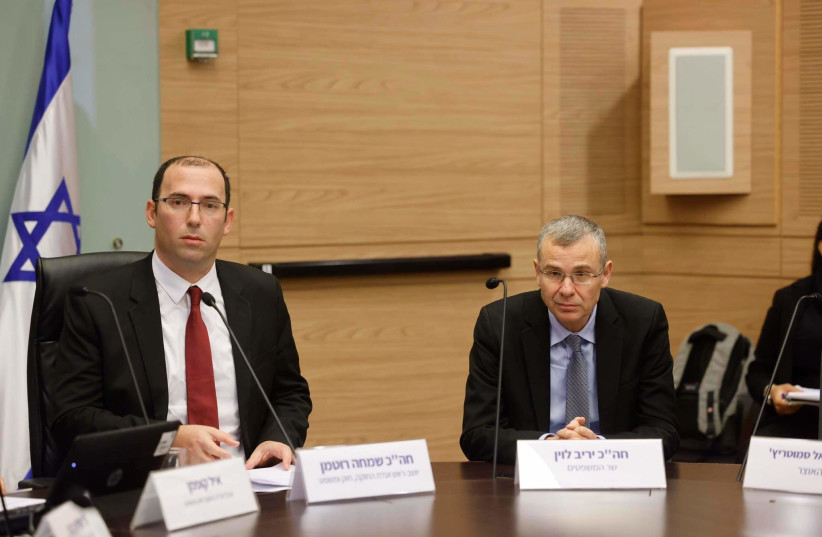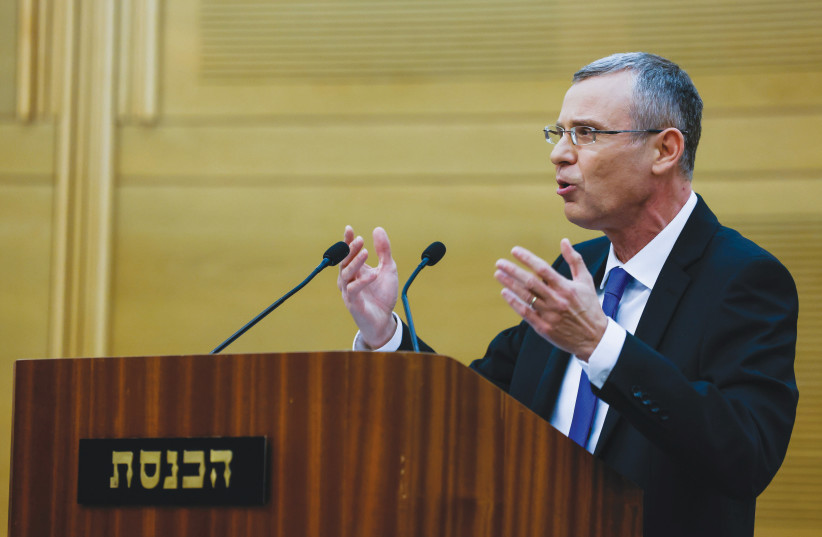by Michael Starr, Eliav Breuer
The judicial reform was first announced by Justice Minister Yariv Levin last Wednesday and includes several items.
 |
MK Simcha Rothman and Justice Minister Yariv Levin present next steps for judicial reforms at Knesset legal committee.
(photo credit: MARC ISRAEL SELLEM)
|
The work process for the judicial reform plan was presented by Religious Zionist Party MK Simcha Rothman at the Knesset Constitution, Law and Justice Committee on Wednesday morning.
"We're returning justice to the judicial system," committee chairman Rothman explained, describing the system as one of the most important and fundamental elements of Jewish history and identity.
Next week discussions would begin on the authority of the government and ministers to set their legal positions in the shared operations with the legal system.
Items in the reform would be developed as private, government, and committee bills. Some, as Rothman told The Jerusalem Post on Sunday, would be integrated together into Basic Law amendments. However, Rothman said that thinking on the legislation would be the first step.
"The committee will invite all the experts," explained Rothman. "The heads of the judiciary, past and present, the former justice ministers, the past legal advisors, and also the Attorney-General, and anyone who has information or ideas to contribute to the work process and the fundamental issues at hand. Everyone will be heard, calmly and in-depth, and will be asked to give their opinion on the questions and issues that will be presented to them by the committee members. When we decide that the time is ripe to move towards formulas and solutions, we will do so, but only after the discussion is exhausted."

Members of Knesset from all parties were invited to take part in the deliberations, said Rothman.
The presentation of the plan saw backlash at the committee, with those present shouting him down and attacking the reforms.
"This is a discussion with a loaded gun," shouted one Knesset member.
"You don't believe it yourself!" Someone yelled. "We won't be quiet."
"It's not Jewish enough, it's not Zionist enough," another criticized his assessment of the current state of the system.
The opposition MKs also protested the fact that no actual law proposal was put forward. The MKs accused Rothman and Levin of intending to hold an "academic" discussion that was purely theoretical, instead of allowing the committee to actually debate, and attempt to change, the law itself.
The microphones of those interrupting were shut down, which caused further anger.
Rothman attempted to restore order, but the MKs were eventually ejected from the room.
"When the Knesset legislates, the government governs, and the courts judge justice - the public's trust in all government authorities will increase and strengthen," Rothman said.
The reform plan has seen the eruption of protests outside the Knesset as well. On Friday the Darkenu movement held a demonstration in front of the justice minister's house. On Saturday, around 30,000 people, including a large contingent from a coalition of left-wing organizations, marched through Tel Aviv. Organizers pledged to continue this protest this coming Saturday.
Levin denounced the rhetoric used regarding the plan by former justices and other officials.
What is in the judicial reform?
The judicial reform was first announced by Justice Minister Yariv Levin last Wednesday and includes several items discussed during the 2022 general election campaign that will restrict the power of the High Court of Justice and give new powers to the Knesset.
RZP presented a detailed plan in the weeks leading up to the November 1 election to reform the judicial system. The plan, called "Law and Justice," was even wider than Levin's plan, and included additional controversial clauses such as cancelling the crime of "breach of trust," for which Prime Minister Benjamin Netanyahu is currently standing trial.
However, the Likud did not present a similar plan, nor did it say whether or not it agreed with RZP's plan. In addition, the coalition agreements between the Likud and its partners only includes a general clause that says that the reforms are the coalition's first priority - without going into detail about what exactly the reforms were going to be.
Therefore, the claim that the "nation wanted these reforms" was false, Labor MK Gilad Kariv and Yesh Atid MK Karine Elharrar argued, since many of the Likud's one million voters did not necessarily support it.
One of the main items of the plan is the Override Clause, which will allow a simple majority in the Knesset to overturn High Court striking of the parliament's legislation. The court will also be required to achieve a special majority to engage in intervention on Basic Laws.
Levin has called for the removal of the Reasonableness Clause, which allows for the intervention of the courts in administration that is beyond the scope of what a reasonable and responsible authority with engage in.
The plan also addresses structural administrative issues. The committee for selecting judges would receive two additional politicians instead of judges, giving the judges a majority. Government legal advisors would be required to commit to government positions, rather than independent opinions.
"We will discuss with everyone," said Rothman. "We will issue a justice system for the citizens of the State of Israel. A judicial system that can win the trust of the public. A justice system to be proud of."
Michael Starr, Eliav Breuer
Source: https://www.jpost.com/israel-news/article-728206
No comments:
Post a Comment